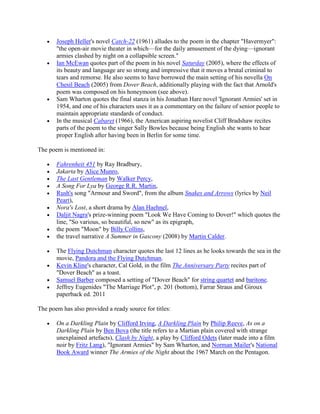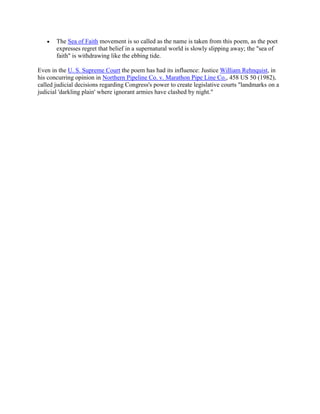The document provides a detailed analysis and summary of Matthew Arnold's poem "Dover Beach". It begins by summarizing the poem's opening description of the beach at Dover and references made to Sophocles. It then analyzes various interpretations of metaphors and themes in the poem, such as the retreating sea representing the loss of religious faith. The document also discusses the poem's composition, influences on other works, and critical commentary on elements like structure, rhythm and symbolism.
![In Stefan Collini's opinion, "Dover Beach" is a difficult poem to analyse, and some of its
passages and metaphors have become so well known that they are hard to see with "fresh
eyes".[3] Arnold begins with a naturalistic and detailed nightscape of the beach at Dover in which
auditory imagery plays a significant role ("Listen! you hear the grating roar").[4] The beach,
however, is bare, with only a hint of humanity in a light that "gleams and is gone".[5] Reflecting
the traditional notion that the poem was written during Arnold's honeymoon (see composition
section), one critic notes that "the speaker might be talking to his bride".[6]
The sea is calm to-night.
The tide is full, the moon lies fair
Upon the straits; —on the French coast the light
Gleams and is gone; the cliffs of England stand,
Glimmering and vast, out in the tranquil bay.
Come to the window, sweet is the night-air!
Only, from the long line of spray
Where the sea meets the moon-blanch'd land,
Listen! you hear the grating roar
Of pebbles which the waves draw back, and fling,
At their return, up the high strand,
Begin, and cease, and then again begin,
With tremulous cadence slow, and bring
The eternal note of sadness in.
Arnold looks at two aspects of this scene, its soundscape (in the first and second stanzas) and the
retreating action of the tide (in the third stanza). He hears the sound of the sea as "the eternal
note of sadness". Sophocles, a 5th-century BC Greek playwright who wrote tragedies on fate and
the will of the gods, also heard this sound as he stood upon the shore of the Aegean Sea.[7][8]
Critics differ widely on how to interpret this image of the Greek classical age. One sees a
difference between Sophocles interpreting the "note of sadness" humanistically, while Arnold in
the industrial nineteenth century hears in this sound the retreat of religion and faith.[9] A more
recent critic connects the two as artists, Sophocles the tragedian, Arnold the lyric poet, each
attempting to transform this note of sadness into "a higher order of experience".[10]
Sophocles long ago
Heard it on the Ægæan, and it brought
Into his mind the turbid ebb and flow
Of human misery; we
Find also in the sound a thought,
Hearing it by this distant northern sea.[11][12]
Having examined the soundscape, Arnold turns to the action of the tide itself and sees in its
retreat a metaphor for the loss of faith in the modern age,[13] once again expressed in an auditory
image ("But now I only hear / Its melancholy, long, withdrawing roar"). This third stanza begins
with an image not of sadness, but of "joyous fulness" similar in beauty to the image with which
the poem opens.[14]](https://image.slidesharecdn.com/doverbeach-140131052428-phpapp02/85/Dover-beach-1-320.jpg)
![The Sea of Faith
Was once, too, at the full, and round earth's shore
Lay like the folds of a bright girdle furl'd.
But now I only hear
Its melancholy, long, withdrawing roar,
Retreating, to the breath
Of the night-wind, down the vast edges drear[15]
And naked shingles of the world.
The final stanza begins with an appeal to love, then moves on to the famous ending metaphor.
Critics have varied in their interpretation of the first two lines; one calls them a "perfunctory
gesture ... swallowed up by the poem's powerfully dark picture",[16] while another sees in them "a
stand against a world of broken faith".[17] Midway between these is one of Arnold's biographers,
who describes being "true / To one another" as "a precarious notion" in a world that has become
"a maze of confusion".[18]
The metaphor with which the poem ends is most likely an allusion to a passage in Thucydides's
account of the Peloponnesian War. He describes an ancient battle that occurred on a similar
beach during the Athenian invasion of Sicily. The battle took place at night; the attacking army
became disoriented while fighting in the darkness and many of their soldiers inadvertently killed
each other.[19] This final image has also been variously interpreted by the critics. Culler calls the
"darkling plain" Arnold's "central statement" of the human condition.[20] Pratt sees the final line
as "only metaphor" and thus susceptible to the "uncertainty" of poetic language.[21]
Ah, love, let us be true
To one another! for the world, which seems
To lie before us like a land of dreams,
So various, so beautiful, so new,
Hath really neither joy, nor love, nor light,
Nor certitude, nor peace, nor help for pain;
And we are here as on a darkling plain
Swept with confused alarms of struggle and flight,
Where ignorant armies clash by night.[22][23]
"The poem's discourse", Honan tells us, "shifts literally and symbolically from the present, to
Sophocles on the Aegean, from Medieval Europe back to the present—and the auditory and
visual images are dramatic and mimetic and didactic. Exploring the dark terror that lies beneath
his happiness in love, the speaker resolves to love—and exigencies of history and the nexus
between lovers are the poem's real issues. That lovers may be 'true / To one another' is a
precarious notion: love in the modern city momentarily gives peace, but nothing else in a postmedieval society reflects or confirms the faithfulness of lovers. Devoid of love and light the
world is a maze of confusion left by 'retreating' faith."[24]
Critics have questioned the unity of the poem, noting that the sea of the opening stanza does not
appear in the final stanza, while the "darkling plain" of the final line is not apparent in the
opening.[25] Various solutions to this problem have been proffered. One critic saw the "darkling](https://image.slidesharecdn.com/doverbeach-140131052428-phpapp02/85/Dover-beach-2-320.jpg)
![plain" with which the poem ends as comparable to the "naked shingles of the world".[26]
"Shingles" here means flat beach cobbles, characteristic of some wave-swept coasts. Another
found the poem "emotionally convincing" even if its logic may be questionable.[27] The same
critic notes that "the poem upends our expectations of metaphor" and sees in this the central
power of the poem.[28] The poem's historicism creates another complicating dynamic. Beginning
in the present it shifts to the classical age of Greece, then (with its concerns for the sea of faith) it
turns to Medieval Europe, before finally returning to the present.[24] The form of the poem itself
has drawn considerable comment. Critics have noted the careful diction in the opening
description,[29] the overall, spell-binding rhythm and cadence of the poem[30] and its dramatic
character.[31] One commentator sees the strophe-antistrophe of the ode at work in the poem, with
an ending that contains something of the "cata-strophe" of tragedy.[32] Finally, one critic sees the
complexity of the poem's structure resulting in "the first major 'free-verse' poem in the
language".[33]
Composition[edit]
According to Tinker and Lowry, "a draft of the first twenty-eight lines of the poem" was written
in pencil "on the back of a folded sheet of paper containing notes on the career of
Empedocles".[34] Allott concludes that the notes are probably from around 1849–50.[35]
"Empedocles on Etna", again according to Allott, was probably written 1849–52; the notes on
Empedocles are likely to be contemporary with the writing of that poem.[36]
The final line of this draft is:
And naked shingles of the world. Ah love &c
Tinker and Lowry conclude that this "seem[s] to indicate that the last nine lines of the poem as
we know it were already in existence when the portion regarding the ebb and flow of the sea at
Dover was composed." This would make the manuscript "a prelude to the concluding paragraph"
of the poem in which "there is no reference to the sea or tides".[37]
Ah, love, let us be true
To one another! for the world, which seems
To lie before us like a land of dreams,
So various, so beautiful, so new,
Hath really neither joy, nor love, nor light,
Nor certitude, nor peace, nor help from pain;
And we are here as on a darkling plain
Swept with confused alarms of struggle and flight,
Where ignorant armies clash by night.
Arnold's visits to Dover may also provide some clue to the date of composition. Allott has
Arnold in Dover in June 1851 and again in October of that year "on his return from his delayed
continental honeymoon". To critics who conclude that ll. 1–28 were written at Dover and ll. 29–
37 "were rescued from some discarded poem" Allott suggests the contrary, i.e., that the final](https://image.slidesharecdn.com/doverbeach-140131052428-phpapp02/85/Dover-beach-3-320.jpg)
![lines "were written at Dover in late June," while "ll. 29–37 were written in London shortly
afterwards".[29]
Influence[edit]
William Butler Yeats responds directly to Arnold's pessimism in his four-line poem, "The
Nineteenth Century and After" (1929):
Though the great song return no more
There's keen delight in what we have:
The rattle of pebbles on the shore
Under the receding wave.
Anthony Hecht, US Poet Laureate, replied to "Dover Beach" in his poem "The Dover Bitch".[38]
So there stood Matthew Arnold and this girl
With the cliffs of England crumbling away behind them,
And he said to her, "Try to be true to me,
And I'll do the same for you, for things are bad
All over, etc. etc."
The anonymous figure to whom Arnold addresses his poem becomes the subject of Hecht's
poem. In Hecht's poem she "caught the bitter allusion to the sea", imagined "what his whiskers
would feel like / On the back of her neck", and felt sad as she looked out across the channel.
"And then she got really angry" at the thought that she had become "a sort of mournful cosmic
last resort". After which she says "one or two unprintable things".
But you mustn't judge her by that. What I mean to say is,
She's really all right. I still see her once in a while
And she always treats me right.[39]
Kenneth and Miriam Allott, referring to "Dover Bitch" as "an irreverent jeu d'esprit",
nonetheless see, particularly in the line "a sort of mournful cosmic last resort", an extension of
the original poem's main theme.[40]
"Dover Beach" has been mentioned in a number of novels, plays, poems, and films:
In Dodie Smith's novel, I Capture the Castle (1940), the book's protagonist remarks that
Debussy's Clair de Lune reminds her of "Dover Beach" (in the film adaptation of the
novel, the character quotes (or, rather, misquotes) a line from the poem).
In Fahrenheit 451 (1951), author Ray Bradbury has his protagonist Guy Montag read part
of "Dover Beach" to his wife Mildred and her friends to show them what literature is
about and why books should not be burnt. One of Mildred's friends cries over the poetry
while the rest of it complain over how filthy it is and how Montag is nasty.](https://image.slidesharecdn.com/doverbeach-140131052428-phpapp02/85/Dover-beach-4-320.jpg)

